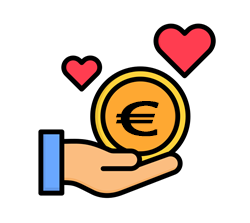A Pure Water donation is a financial or material contribution made to help provide clean, safe drinking water to communities in need—especially in regions where access to clean water is limited or non-existent. These donations support the creation of sustainable water systems like wells, filtration devices, and rainwater harvesting systems.

Our Services
Pure Water
Healthy Food
A healthy food donation involves giving nutritious, non-expired food—or funds to purchase such food—to individuals and families in need through food banks, soup kitchens, schools, and community organizations.
Healthy donations go beyond just feeding people—they help improve overall health, reduce the risk of chronic diseases, and support kids’ growth and learning.
Education
An education donation is any contribution—money, materials, or time—given to support learning and access to education. These donations can help:
Build or equip schools.
Provide scholarships for students.
Supply school materials (books, uniforms, tech).
Train teachers and improve educational quality.
Fund after-school or tutoring programs.
Medical Facilities
A medical facilities donation refers to giving money, equipment, supplies, or time to help hospitals, clinics, and health centers deliver better care. Donations can support:
Building or renovating clinics.
Purchasing medical equipment (beds, monitors, ventilators).
Providing medications and hygiene supplies.
Funding staff training or operational costs.
Expanding access to care in rural or conflict-affected regions.
Social Activities
A social activities donation refers to giving financial support, goods, or volunteer time to events, programs, or initiatives designed to improve community well-being. These activities may include:
Community festivals, fairs, or cultural events.
Sports leagues for youth or adults.
Youth mentoring or after-school programs.
Support for the elderly, like senior activities or outings.
Workshops or classes (art, health, career development, etc.).
Mental health and wellness programs.
Charity runs, walks, or marathons.
Civic engagement activities (voting drives, awareness campaigns).
The goal is to promote social interaction, well-being, and community development.
Receive Donation
To receive donations means to accept voluntary gifts or contributions from individuals, businesses, or institutions. These donations can be:
Money (cash, online payments, checks)
Goods (clothes, food, books, supplies)
Services (volunteering, legal advice, design work)
You might receive donations to:
Support a charity, nonprofit, or personal cause
Help with a medical expense, emergency, or community project
Fund a business startup, school, or adoption
Assist victims of disasters, refugees, or students in need
Adoption
An adoption donation supports efforts that help children without families find permanent, loving homes. Donations can assist with:
Covering adoption fees for hopeful families (domestic and international).
Supporting adoption agencies and services.
Funding orphan care and transitional housing.
Providing counseling, education, and post-adoption support.
Helping children with special needs or those in foster care.
Cloths Donation
A clothes donation is when you give new or gently used clothing to:
People in need (e.g., the homeless, refugees, disaster survivors)
Charitable organizations or thrift stores
Schools, shelters, or community programs
These donations are usually free of charge to the recipients or sold to fund social programs.
